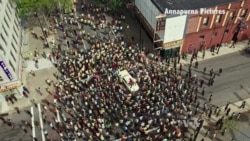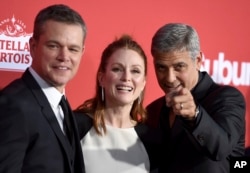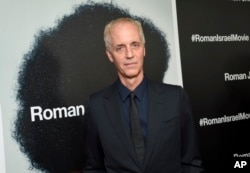America's history of racial inequality and civil rights activism are prevalent themes in Hollywood films this season. Using gritty cinematography and A-list actors, directors Kathryn Bigelow, George Clooney and Dan Gilroy highlight America's history of racial injustice, as well as opening up a conversation about racial tensions in the present.
The film drama Detroit by Academy Award-winning filmmaker Bigelow is based on the riots that tore apart the city of Detroit in 1967. "These riots, this was anger that was building and it was on a collision course in 1967," the filmmaker said.
Major American cities such as Detroit became the battleground for discontented African-Americans facing unemployment and racial discrimination in housing and education. In her film, Bigelow focuses on a chain of events one night during the riots when a group of innocent African-Americans were caught up in the violence and beaten by police.
Trying to escape the riots, a group of Motown singers seek refuge in the low-budget Algiers hotel downtown, but tensions follow them there. An African-American hotel resident points a toy gun at another, trying to make the point that a white society always points the proverbial gun at African-Americans. Police forces on the ground take the popping sound of the fake gun coming from the hotel as a potential sniper attack. They open fire at the hotel and then raid it.
Will Poulter portrays racist officer Krauss, a composite of police officers, who intimidates and brutalizes the youth in the hotel, to recover what he thought was a real gun. Three young men are killed, and police detectives arrest an African-American security guard in an effort to pin the crime on him. John Boyega plays real-life security guard Melvin Dismukes, who witnessed the events at the hotel and tried to intervene to diffuse the situation.
"He was an unspoken guardian angel to those boys that were there," Boyega said.
An Oscar-worthy film, Detroit combines a cinéma vérité approach with taut drama. Weaving historic footage into dramatic sequences, the film immerses the audience into the riots as the pivotal moment of racial injustice and repression.
"My hope is that the film could maybe stimulate greater conversation," Bigelow said.
Suburbicon
Tensions in white American suburbs of the 1950s are explored in Clooney's dark satire Suburbicon. Like Bigelow, Clooney uses real-life racial tensions as a counterpoint to his murder mystery. He places his story in Suburbicon, a town modeled on the first all-white suburb of Levittown, Pennsylvania.
A corrupt middle-management executive, played by Matt Damon, commits murder, fraud and adultery while the largely oblivious community turns its attention and indignation against the Myers family, the first African-American family to move there. Clooney said the movie was made before President Donald Trump was elected and racial tensions became a higher profile issue in American political life.
"It was in the middle of the campaign, and it seemed it was fun to talk about it and remind people that these are not new subjects — we continue to have these for the history of this country," he said.
Though the film carries the satirical stamp of writers Joel and Ethan Cohen, it emerges rather disjointed in its effort to balance the irony of all-white suburbanites fearing for their security by their African-American neighbors, while their so-called respectable white neighbor gets away with murder.
Roman J. Israel Esq.
In Roman J. Israel Esq., filmmaker Gilroy crafts a character drama that targets institutionalized racism through a corrupt judicial system. The story takes place in present day Los Angeles and revolves around Roman, a socially awkward lawyer who takes on the justice system with supreme legal knowledge but no people skills.
When his boss dies, Roman, the firm's backroom consultant for decades, is forced out of the shadows to actively represent clients in court. He comes face to face with an overburdened justice system which disproportionately affects African-Americans.
Gilroy says his story, like his character, is reminiscent of the political activism of the 1960s and '70s.
"The story spoke to me on a very contemporary level," he said. "There are things going on right now legally, constitutionally, nationally and internationally that the story became a focus. One of the elements of the film that I hope people take out is, feel empowered."
Unfortunately, the film's message gets buried under the legal jargon and Denzel Washington's challenging performance as a loner who seems to have stepped out of the '70s does not connect with the audience.
Despite their hits and misses, all three films address racial tensions then and now, as well as the potential of racial reconciliation and tolerance.








